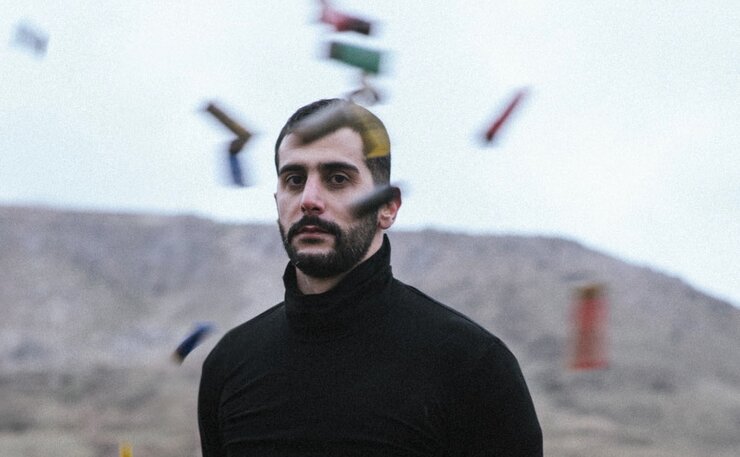
Ali Chahrour is a recurring guest at the Zürcher Theater Spektakel. The Lebanese choreographer presented his piece «Layl (Night)» on the Lake Stage (Seebühne) in 2019 and was awarded the ZKB Patronage Prize in 2022 for «The Love Behind My Eyes.» Beirut is the center of Ali Chahrour's life and work. The constantly changing city and its people are a major inspiration for his creations. Based on the personal stories and body archives of various professional as well as non-professional performers, the artist's empathetic works explore emotional landscapes of loss, longing, and hope. Despite political and economic crises, the Covid-19 pandemic, the explosion in the port of Beirut, and the recent military attacks, mass displacement, and emigration, Ali Chahrour and his team have continued their artistic work in Lebanon. Through their creations, they also collectively process their own experiences. Dramaturg and curator Maria Rößler spoke to Ali Chahrour at the beginning of the new year.
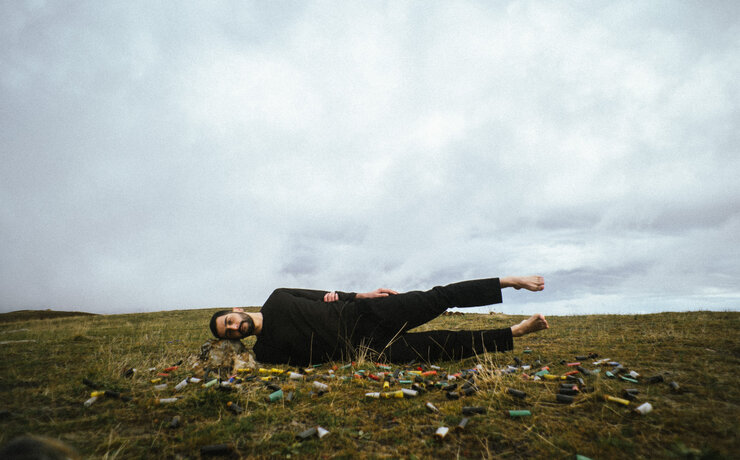
Ali, thank you for taking the time to meet me at the start of this new year.
It’s my pleasure.
For your latest creation «Iza Hawa», you choreographed a breathtaking performance that tells the love story of two legendary theatre artists – Hanane Hajj-Ali and Roger Assaf. They have lived and worked in Beirut through the most turbulent times. The piece is also an homage to the battered city itself. What was your inspiration for «Iza Hawa» (Arabic for «falling» and «falling in love»)? And how has this artistic journey been for you and the protagonists of the piece so far?
I started with the question: What does it mean to grow old in a city that is constantly collapsing? I was thinking about my mother, the parents of my friends, and the people who have lived through so much in this country, where crises continue to escalate. Their entire lives, they have worked and tried to build some sense of security, only to reach old age and find that there’s nothing left...
Hanane and Roger were my teachers when I studied theatre at the Lebanese University. I know their books, their approaches to theatre, and their plays. But beyond that, I am deeply moved by their relationship – the care and love they share. That’s why I invited them to create a performance together.
People like Hanane and Roger have given so much to this country. The question is: What has the country given them in return for all their work? While we were creating this performance, we couldn’t access our money in the banks, there was a shortage of medication, and healthcare was practically non-existent. Electricity is unreliable, and there’s no fuel. Eventually, Hanane and Roger – who is over 80 years old – had to leave the country because there is still no medical or economic security here. To me, Roger leaving Beirut feels like losing a pillar of the country. He spent his entire life in Lebanon. I remember a very emotional moment when I met Roger while he was considering leaving Beirut. He simply said: «At my age, I can't handle another winter in Beirut.»
Basic human needs cannot be met in Lebanon. As clichéd as it may sound, the only thing we have left is love. What keeps us together, gives us strength to continue our work, to collaborate, and to face these challenges are the small, beautiful encounters we share and the love we have for each other. That was the foundation of «Iza Hawa.»
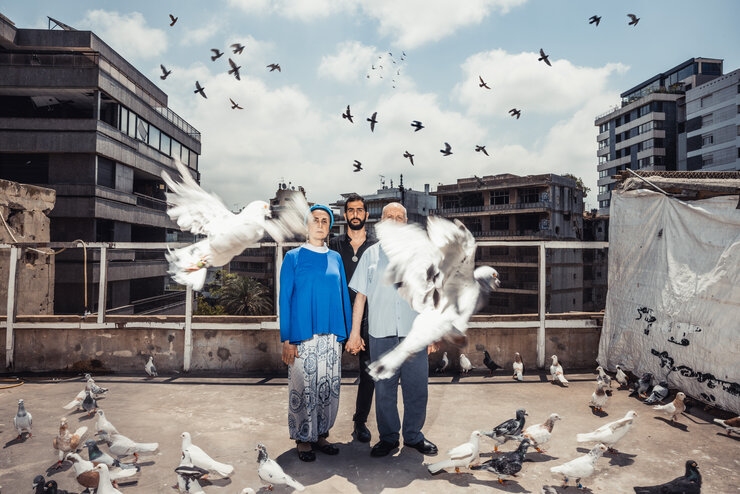
You have been co-producing most of your latest creations in collaboration with international partners. But you always premiere your work in Beirut before sharing it with audiences abroad. Why is this important to you? And what does it mean to produce and to put on a show in a theatre venue in Beirut?
Yes, all my work is inspired by and based on stories from Lebanon – unheard stories that are hidden in the homes and alleys of Beirut. In a way, it’s as if we are rewriting the story of this country through the most intimate, personal narratives. These stories reveal so much about the context, going beyond political statements or news reports. You can understand a lot about this place from the story of a mother and her son or the story of Hanane and Roger. This means a lot to me. My work is deeply rooted here, and I don’t think it’s ever finished or complete until it meets the local audience. It challenges their politics, their social circumstances, and their taboos. When I create a work, what I care about most is how my mother, our neighbors, and the people in Lebanon will react to it.
Producing and performing in Beirut is always a struggle. There are no rehearsal spaces, and renting theaters is prohibitively expensive. On top of the rent, you have to bring your own fuel for the electricity generators just to keep the lights on. There’s a lot of logistical trouble, but I think it’s worth it. I believe that, in Lebanon, theatre is now the only place where people come together in one space to share a live moment. It’s where the audience can observe and question their beliefs, their political views, and their relationship with society. That’s why I’m committed to making art inside Lebanon. My form of resistance is creating art – and doing it here, specifically.
Indeed. The people in Lebanon have been confronted with multiple crises and existential problems for decades, due to which more and more people are leaving the country. This must mean that the local art scene and the audiences are changing as well. How do you find your audience in a city that keeps changing so much?
Definitely. Many of the people who watched our performances five years ago are no longer in the country. They left during the economic crisis. Many of our friends, artists, and people who care about art and culture – they’re not here anymore. So, you can’t build a stable audience in Lebanon.
At the same time, I believe that people still care about theatre. Even during the recent war in Lebanon, theatre performances took place, and audiences came to watch them – that says something. There is a real need for theatre.
Pursuing art and making theatre or dance is a very fragile career in Lebanon. But I believe that artists are the only hope for this country. When they leave, it feels like Beirut loses its soul; as if the city’s heart is missing.
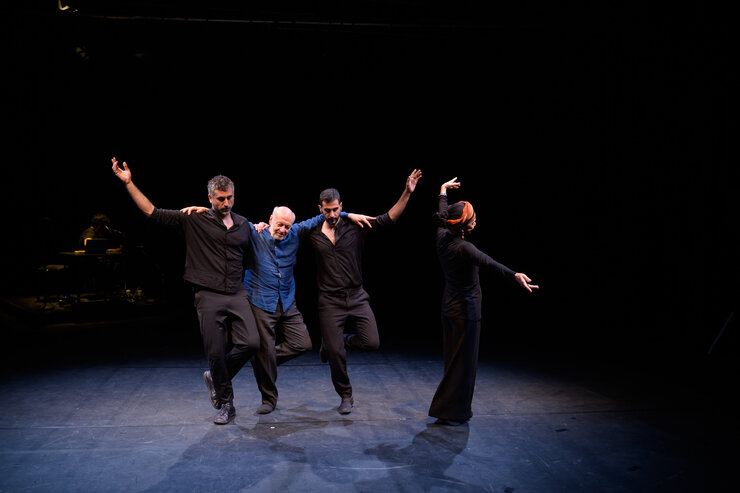
Last year, the heavy Israeli bombardment of Lebanon, including Beirut, destroyed much of the civilian infrastructure, leaving many people without shelter. The war had a devastating impact on the population. A ceasefire has been in place for a few weeks now. What did the military attacks mean for art and the community of artists who are still living in Lebanon? How do you perceive everyday life in Beirut?
Personally, I feel like I’m not the same person after the war last year. I’ve never witnessed or lived through anything like that. I’ve never been so scared to sleep, to wake up and find that my house or my family’s house had been destroyed, or that someone close to me had died because of the bombing.
So, I have this existential question: What do we have to say now, as artists? What can we express with our bodies? It’s something I still struggle to find the words for – how to describe what we experienced during that war. After witnessing the collapse of entire buildings within seconds, and seeing how 1.4 million Lebanese people lost their homes, sleeping in the streets or by the sea, searching for shelter. The south of Lebanon was completely burned. Our family members, friends, and colleagues died, and some bodies are still trapped under the rubble even now. It’s horrifying, and I don’t know what art can do in response to war. I had to rethink all my ideas, center my emotions, and ask myself: What is it that I have to say after all this?
I have come to understand that there is no justice in the world. And I think that, especially since October 7th, it has become very clear that there cannot be justice. There will not be justice for all the people who died in the war, nor will there be justice for all the fear we have been living through.
We had to make critical decisions just to stay grounded, to use the tools and resources we have as artists, to create art while at the same time supporting and helping others. For me, right now, resistance is about keeping stories alive by telling them and making them heard. Perhaps some kind of justice can be achieved by telling the stories of those who live through these catastrophic events.
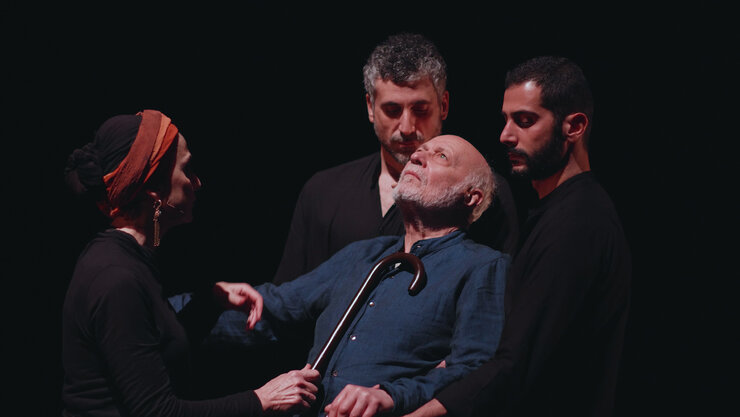
You tour internationally with your work, and you continued to do so even during the war last year, despite the risks involved. In such circumstances, how does it feel to navigate between the vastly different realities of various countries and continents?
Leaving Lebanon during the war was one of the most intensely stressful experiences I’ve ever had – because I was leaving my family behind without really knowing if I would be able to come back soon. When I left, for example, to go to Paris for a guest performance in November, going to the Beirut airport was surreal. The airport had been bombed, and there was smoke everywhere as I was boarding the plane. We didn’t know if the plane would actually take off. When I arrived in Paris, the first two days, I mostly stayed in my hotel room. I didn’t want to go out. People there were living like everything was normal. They were happy, celebrating, having drinks. Restaurants were full, the audiences were cheering and clapping… Life seemed to be going on there as usual, while back home everything was collapsing. I was following the news all the time. It was such a strange feeling, and I didn’t know how to handle it. I could barely respond to the compassion that people were offering me. I couldn't talk about my feelings; I felt like I wouldn’t be able to stop crying. Emotionally, I was completely overwhelmed.
I was shocked by how disconnected the world is from us, from this region. I was shocked by how people in Europe were simply going on with their lives. Yes, they have the right to be happy. But we are dying, and yet we’ve come here to perform for them. Experiencing that, seeing how much denial there is, how much the world – especially Europe – is disconnected from our realities, I have to admit, was painful.
We refuse to let our work be reduced to a checkbox, in the sense of, «Here is a performance from Lebanon, from the Arab world. Done.» That said, my team and I had two choices: either we stop working, stay at home, and allow our voices to be silenced, or we keep going, remain present, and express ourselves by sharing our art with the world. We insist on being visible in the world and on saying what we need to say, in the way we want to say it.

And so, despite it all, you have started working on a new creation. What can you already share with us about this project?
«When I Saw the Sea» is a project I’ve been envisioning for a long time. It focuses on migrant domestic workers who come to Lebanon under the Kafala system, a structure that essentially facilitates modern slavery. These individuals – mostly women – arrive in Lebanon seeking work to support their families back home but often find themselves trapped in a nightmare of exploitation and violence. They become slaves for Lebanese families, with no protection of their rights. Many of them experience problematic working and living conditions, racist discrimination, and violent abuse, including rape, while most crimes committed against migrant workers are never really investigated or punished.
It is paradoxical to me how people in Lebanon, who have survived war and crises, who were victims of violence themselves, can be so cruel to the vulnerable people who work in their houses and take care of them. When I see a migrant worker on the street, I always wonder what she might be going through. For me, there is also a personal aspect to this: Knowing that my own brother and sister went to Europe as migrant workers, with their own long stories of working insecure jobs for different employers just to earn money to survive and support our family in Lebanon. I reflect on my own family and how I would feel if my brother and sister were living under similar circumstances.
During the war, many migrant domestic workers – women from countries such as Sierra Leone, Cameroon, Senegal, and Ethiopia – were left behind when their Lebanese employers fled to Dubai or Europe. These workers were either locked inside the houses or suddenly abandoned in the street or by the sea. They were left there without passports, money, or food, while the city burned behind them. In those moments, some of them saw the sea for the first time.
In times of war, we know how many Lebanese people are dying, but we will never know how many migrant workers lost their lives. We don’t know what happened to the women who were locked inside houses that were bombed. Some of their bodies remain in hospital morgues because there is no one to pay for their funerals or arrange for their bodies to be sent back to their families. We will never hear their stories. And for those who survive, how did they live through the crises in Lebanon? How did they experience the war? What do they think? What do they feel?
During the war, we began our research. We met with many migrant domestic workers and conducted interviews. Sometimes, we had to interrupt a meeting and run for shelter when a bomb went off nearby. We stopped and started many times. We’ve also been in contact with NGOs that collect records of investigations into crimes against migrant workers. There are so many stories and countless layers to this project.
Some of the women we’ve met have become activists for migrant workers’ rights. They have lived through the Kafala system, yet decided to stay in Lebanon to support their community. We are now working with three migrant domestic workers from this activist group, and they will participate in a performance based on the stories and testimonies we have gathered.
It takes a great deal of courage to speak up publicly and to build resistance against such injustice. It is also a significant artistic and social responsibility to honor and carry the legacy of these deeply challenging personal stories. Thank you for sharing them with us. Best wishes for the rehearsals and the premiere in Beirut!
Thank you.
Credits
Interview: Maria Rößler
Portraits: Lea Skayem
Images «Iza Hawa»: Carl Halal, Agnès Mellon
translated from German into English by Franziska Henner